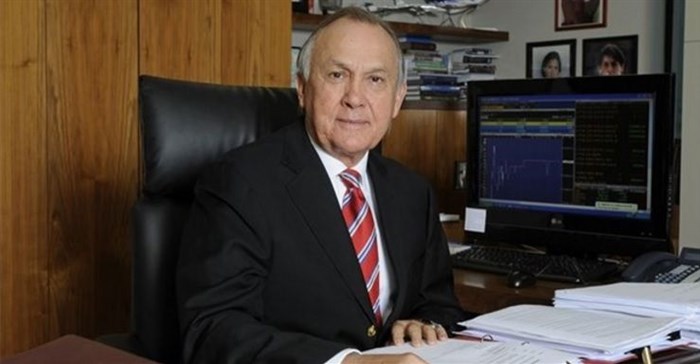Christo Wiese, Shoprite's chairman and its largest shareholder, seems flabbergasted by the outcry over the retail giant's imminent R1.83bn payment to former CEO Whitey Basson in line with a buyback deal struck in December 2003.

Christo Wiese. Image credit: Financial Mail
"There appears to be this general misconception that this is something that was gifted to Basson," he says. "These were his shares. If he had sold them through the market at any time during these 11 years, who would have raised anything about it?
"There's no prejudice to Shoprite.
"I've looked at some of the commentators saying that Whitey Basson is now R1.8bn richer. In other words, in that person's logic, the shares were worth nothing the day before Whitey put them. It kind of escapes my understanding."
What has baffled investors, however, is the lack of disclosure in Shoprite's accounts of the existence of such a "service contract" between the company and Basson, news of which came as a surprise to most when Shoprite notified the market of the buyback of 8.7m shares last month. The buyback is subject to a shareholder vote and Wiese confirmed to the Financial Mail that a circular will be issued in the next two weeks, with an extraordinary general meeting to be scheduled towards the end of August.
There's no shortage of detail on Basson's share ownership in Shoprite's annual reports. But in 2002, 10m shares reflect as options exercisable before September 2007.
Then, in the 2003 annual report, Shoprite says "a share option of 10m shares which existed in favour of JW Basson has been cancelled and substituted by a profit-related bonus arrangement on comparable terms effective July 1 2002 until June 30 2006."
Fast forward to the 2004 annual report, the year in which the agreement to buy Basson's shares was struck. A 10m "share appreciation" once again reflects under Whitey Basson's name, at a strike price of R8.
In that document, "the share appreciation rights entitle these directors to receive cash payments based on the difference between the share price at the date of the exercise of the rights and the strike price which relate to the share price at the date of the grant. In the case of Basson, the payments will be reduced by the accumulated performance bonuses paid to him since the date of the grant."
There is no mention of the December 2003 agreement under which Basson was entitled to sell shares he owned - directly or indirectly - back to Shoprite at the "middle market price" on the day of exercising the sale.
Wiese, who serves on Shoprite's remuneration committee, says the "unanimous" advice that Shoprite received from its experts at the time was that there was "no need" to disclose the agreement as a liability. "I asked for an opinion on it when this whole furore erupted, and they said it wasn't necessary then and it wasn't necessary subsequently," says Wiese.
According to Bernard Agulhas, CEO of the Independent Regulatory Board for Auditors, "this type of instrument appears to have features of a liability. This is because it appears that the company could not avoid repayment and the option was that of the shareholder (not the company)." But, he says, "I imagine the auditors would have included such an instrument in their scope."
Agulhas is wary of giving a view on whether Shoprite's advice in its accounting was appropriate. But stockbroking veteran and accountant David Shapiro is highly critical of Shoprite's lack of disclosure.
"In my view it's material in the sense that Shoprite has to buy back their shares. That would force the company into a major cash layout, and as an analyst I would have liked to know that," says Shapiro. He's also critical of companies' practice of burying important information in the notes at the end of an annual report. "You need persistence to actually be interested in ploughing through 75 pages of accounting jargon," he says.
"They shouldn't do that. That's a yellow-card incident. In my view it's slightly devious. These are things we should know."
Wiese acknowledges that Shoprite could have been clearer in the way it has communicated the share buyback to the market, but appears mystified by the consternation over the amount for which Shoprite is now in hock. It's not as if Shoprite - if shareholders approve it - is paying out something for which it gets nothing in return."
But it is going to cost the company. Shoprite plans to use existing bank facilities to buy back the stock, which will lump it with an extra interest charge of R144m/year.
Still, as far as Wiese is concerned, Basson has earned every last penny. In the 2004 financial year ended June, Shoprite made sales of just over R27bn and produced a pretax profit of almost R813m. Twelve years later, for the year ended June 2016, revenue had grown to R130bn and pretax profit came to R6.8bn.
At the time the share agreement was reached in December 2003, Shoprite shares were trading at just over R9 and Basson's strike price was set at R8/share.
That means that if he'd chosen to sell his 10m shares then, he would have walked away with R13.5m before tax. A tidy sum, but hardly worth headlines. And given that Shoprite stock had struggled to climb above R10 since 1998, the prospect that the shares would one day trade north of R200 must have seemed unimaginably distant.
But in September 2004, Shoprite stock broke convincingly above the R10 mark and it's been off to the races since. The "middle market price" of May 2 that Shoprite will pay Basson was R211, now worth R1.83bn. That implies a gain of 2,156% in Shoprite's share price, excluding dividends, since the deal was struck.
Asked whether investors will vote in favour of the buyback, Wiese says "having regard to the fact that it was a service contract and an arrangement entered into between a very valuable employee and an employer that he had served very well, for 37 years, why would shareholders not approve it?
"Look at the numbers a business like Shoprite is involved in and then tell me whether it is a big number."
Source: Financial Mail













































